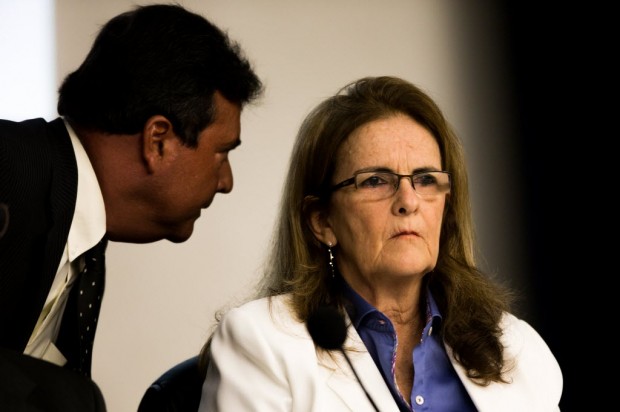Not long ago, Dilma Rousseff and Maria das Graças Foster were widely praised as the new faces of Latin America. Now, the billion-dollar corruption scandal has finally brought down Petrobras CEO Maria das Graças Foster (above). She had to go. But with President Dilma Rousseff also against the wall, 2015 is shaping up to be very difficult for the region’s few female leaders.
After months of speculation and some high-profile back-and-forth, Maria das Gracas Foster, Petrobras chief executive since 2012, resigned on Tuesday along with five other directors. The news sent Petrobras stock prices soaring; the rebound made up for losses that came last week after the company released unaudited and incomplete statements.
Investors are right to want new leadership at the company, which is facing serious problems on all fronts. Dilma Rousseff, who is close to Foster, likely did all she could to stave off the CEO’s departure.
But what should we make of news that former Brazilian president Luiz Inácio “Lula” da Silva was reportedly pressuring Rousseff to accept Foster’s resignation (which is said to have already been thrice offered and thrice refused). It’s no secret Lula may be thinking of staging a comeback in 2018. But is former guerrilla Rousseff not her own woman? The leader of Brazil?
In 2012, closer to the height of the euphoria surrounding Brazil, Foster had been appointed not only because as a Petrobras lifer (rumored to bleed green and yellow [and not on account of exposure to fracking fluid]) she had the technical chops, but because she could be a symbol of the country’s economic and social progress.
Brazil is well known for its machismo, and the storybook ascent of a female who had pulled herself out of very real poverty to become the leader of the country’s most important company was a loud retort to all those who claimed Brazil’s gender relations were antiquated.
At the same time, Mr. Eike Batista, the white son of Brazilian privilege, was creating his own “up by his own bootstraps” myth, which was also peddled around the country in response to claims that it lacked a culture of entrepreneurship. The legend was as inflated as OGX’s prospects, and both eventually collapsed.
Foster’s arrival at the top belied very real gender equality issues in Brazil the same way Barack Obama’s ascent distorted the reality of race relations in the U.S. At a time when people were complaining that Brazil was applying a new paint job, rather than going through a process of fundamental change, Foster was the brightest coat on the market.
Though an icon for the company and the country’s quick development in economic and social issues, Foster was also given the reigns in an attempt to steer the company away from the good ol’ boy culture that created the conditions for all of the corruption that is alleged to have happened…starting long before she took over.
Foster was faced with tough decisions left over after the departure of previous CEO Jose Sergio Gabrielli. The well-connected Gabrielli exited when Petrobras image was near its strongest, though there were a host of problems waiting to be uncovered.
Brazilian president Dilma Rousseff is another classic figure of the same type – a donna, in Brazil’s patriarchal vocabulary, a firm woman who would get the house in order. Like Foster, she has been counted on to fix problems that were partially caused by men.
In the public’s mind, Foster failed to complete her task—though efficiency programs introduced during her time at the head of the firm produced some real results — and must be jettisoned to make way for the next leader, like another white male. The same fate awaits Rousseff in 2018, if not even before.
Female directors in Brazil account for a paltry 7%, on par with Argentina but well below the Colombia and Peru. Since July 2014, “the number of women CEOs in the Global 500 has dropped from 17 to 14. Non-American CEOs, like Foster, have led the exodus,” according to Fortune magazine. But Foster’s directorship was even more spectacular because it was an oil company, an industry not known for its minority leaders. The importance of her position was not limited to Brazil, but was an accomplishment celebrated around the world.
Nearby, in Argentina, President Cristina Kirchner has problems of her own.
Foster’s legacy may not fare well. She may have failed to quell the chaos unleashed by very necessary investigations into shady dealings at Petrobras, but, based on information disclosed thus far, did not engage in dealings herself.
In a time like this, when the market gods require a sacrifice, everyone must go. There is a long list of heads that could, and may still, roll for what’s allegedly transpired. Foster may be the big name that will calm the hysteria in the short-term, but it’s unlikely to fix a much bigger problem that has dogged Brazil for ages.
Next week, Cariocas will don a Gracas Foster-inspired Carnaval mask, which have been flying off the shelves as the Petrolão heats up. An honor, or that’s how it was sold when a mask of Joaquim Barbosa, the Afro-Brazilian supreme court judge of Mensalão fame, was the must-have mask of 2012. Foster may be reduced to a Carnaval novelty, but let’s hope the change she represented for women does not go the same way she went.


